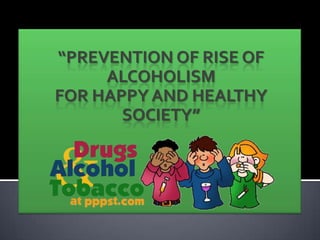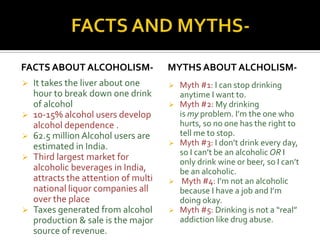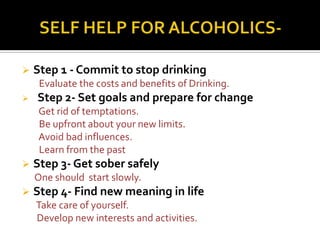PREVENTION OF ALCOHOLISM
- 1. ŌĆ£PREVENTION OF RISE OF ALCOHOLISM FOR HAPPY AND HEALTHY SOCIETYŌĆØ
- 2. Alcohol is a drug and ŌĆ£AlcoholismŌĆØ is a recognized medical illness acquired by those susceptible to it, who begin drinking for many reasons.
- 3. ’āś Usually, a variety of factors contribute to the development of a problem with alcohol. ’āś Social factors such as the influence of family, peers and society, and the availability of alcohol. ’āś Psychological factors such as elevated levels of stress, inadequate coping mechanisms, and reinforcement of alcohol use from other drinkers can contribute to alcoholism. ’āś Also, the factors contributing to initial alcohol use may vary from those maintaining it, once the disease develops.
- 4. ’āś Repeatedly neglecting your ’āś Using alcohol in situations where responsibilities at home, work, or itŌĆÖs physically dangerous, such as school because of your drinking. For drinking and driving, operating example, performing poorly at machinery while intoxicated, or work, flunking classes, neglecting mixing alcohol with prescription your kids or skipping out on medication against doctorŌĆÖs orders. commitments because youŌĆÖre hung over. ’āś Drinking as a way to relax or de- ’āś Physical dependence on alcohol. stress. Many drinking problems If you rely on alcohol to function or start when people use alcohol to feel physically compelled to drink, self-soothe and relieve stress. youŌĆÖre an alcoholic. ’āś Experiencing repeated legal ’āś Continuing to drink even though problem on account of your your alcohol use is causing drinking. problems in your relationships.
- 6. FACTS ABOUT ALCOHOLISM- MYTHS ABOUT ALCHOLISM- ’āś It takes the liver about one ’āś Myth #1: I can stop drinking hour to break down one drink anytime I want to. of alcohol ’āś Myth #2: My drinking ’āś 10-15% alcohol users develop is my problem. IŌĆÖm the one who alcohol dependence . hurts, so no one has the right to ’āś 62.5 million Alcohol users are tell me to stop. estimated in India. ’āś Myth #3: I donŌĆÖt drink every day, so I canŌĆÖt be an alcoholic OR I ’āś Third largest market for only drink wine or beer, so I canŌĆÖt alcoholic beverages in India, be an alcoholic. attracts the attention of multi ’āś Myth #4: IŌĆÖm not an alcoholic national liquor companies all because I have a job and IŌĆÖm over the place doing okay. ’āś Taxes generated from alcohol ’āś Myth #5: Drinking is not a ŌĆ£realŌĆØ production & sale is the major addiction like drug abuse. source of revenue.
- 7. ’āś heart damage ’āś brain damage with ’āś high blood pressure mood and personality ’āś liver disease changes ’āś cancers of the ’āś concentration and digestive system memory problems ’āś other digestive system ’āś nutrition-related disorders (eg stomach problems ulcers) ’āś risks to unborn babies. ’āś sexual impotence and ’āś Impacts on reduced fertility relationships, finances, ’āś risk of breast cancer work and legal ’āś sleeping difficulties problems.
- 9. STAGES AVERAGE EFFECTS CONSUMPTION Feeling of well-being Up to .05 g% ŌĆóTalkative ŌĆóRelaxed ŌĆóMore confident Some raised risk 0.05-.08 g% ŌĆóOver confidence ŌĆóJudgment and ŌĆómovement impaired Moderately raised 0.15-.30 g% ŌĆó walking difficulty state ŌĆóApathetic sleepy ŌĆóbreathing problems ŌĆóMemory loss ŌĆóLoss f bladder control ŌĆóPossible loss of consciousness Death Over .30 g% ŌĆóComa ŌĆóDeath
- 10. George Best Peter Cook (Football player) (Actor)
- 11. Yootha Joyce Oliver Reed (Singer and actress) (Actor)
- 13. Acc to Barker Prevention is- ŌĆ£Actions taken by social workers and others to minimize or eliminate those social, psychological, or other conditions known to contribute to physical or emotional illnesses. Prevention includes establishing those conditions in society that enhance the opportunities for individuals, families and communities to achieve positive fulfillment.ŌĆØ
- 14. ’āś Step 1 - Commit to stop drinking Evaluate the costs and benefits of Drinking. ’āś Step 2- Set goals and prepare for change Get rid of temptations. Be upfront about your new limits. Avoid bad influences. Learn from the past ’āś Step 3- Get sober safely One should start slowly. ’āś Step 4- Find new meaning in life Take care of yourself. Develop new interests and activities.
- 15. ’āś Step 5- Plan for triggers and cravings Practice saying ŌĆ£noŌĆØ to alcohol in social situations. Distract yourself until the urge passes. Remind yourself of your reasons for not drinking. ’āś Step 6- Get support ’āś Step 7- Getting started on treatment ThereŌĆÖs no magic bullet or single treatment that works for everyone. EveryoneŌĆÖs needs are different, so itŌĆÖs important that you find a program that feels right to you.
- 16. ’āś Some people can stop drinking The symptoms of alcohol on their own, while others need withdrawal range from mild to medical supervision in order to severe, and include: withdraw from alcohol safely and comfortably. Which option ’ā╝ Headache,Shaking,Sweating is best for you depends on how ’ā╝ Nausea or vomiting much youŌĆÖve been drinking, how ’ā╝ Anxiety and restlessness long youŌĆÖve had a problem, and ’ā╝ Stomach cramps and diarrhea other health issues you may ’ā╝ Trouble sleeping or have. concentrating ’ā╝ Elevated heart rate and blood ’āś When you drink heavily and pressure. frequently, your body becomes Call 911 or go to the emergency physically dependent on alcohol room if you experience any of and goes through withdrawal if the following withdrawal you suddenly stop drinking. symptoms.
- 17. ’āś Alcohol addiction is a curse not only to the individual, but also to his/her family, society and nation . ’āś Hence, we should provide mental & social support to care-givers, families of severely alcoholic dependent people. ’āś And should create strong awareness towards healthy styles of living.
- 21. Designed and Created By- ’üČ SHALINI CHAURASIA ’üČ BTB/09/2009 ’üČ AMITY INSTITUTE OF BIOTECHNOLOGY





















